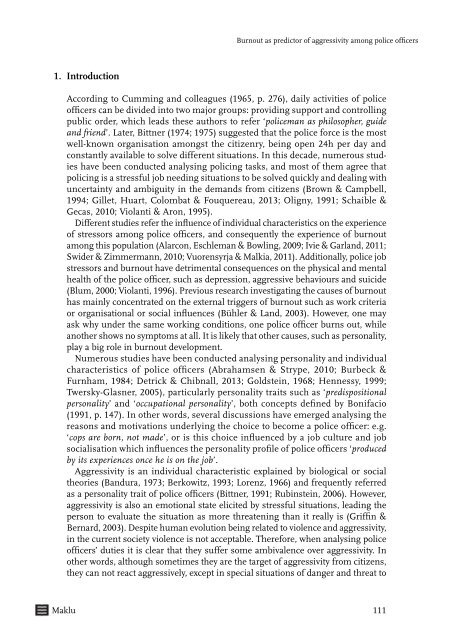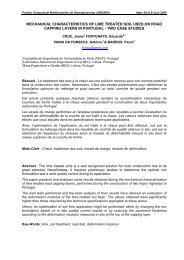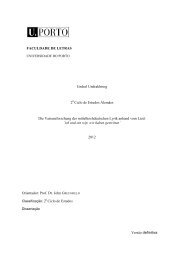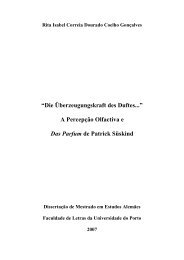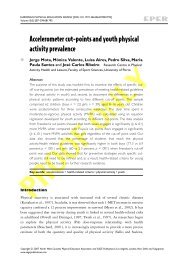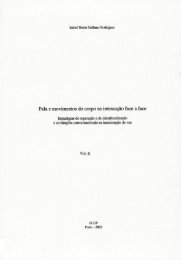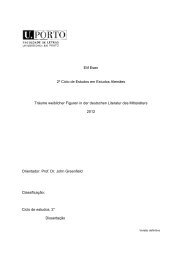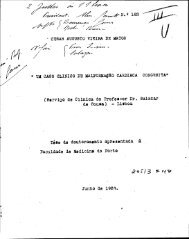Burnout as predictor of aggressivity among police officers
Burnout as predictor of aggressivity among police officers
Burnout as predictor of aggressivity among police officers
Create successful ePaper yourself
Turn your PDF publications into a flip-book with our unique Google optimized e-Paper software.
<strong>Burnout</strong> <strong>as</strong> <strong>predictor</strong> <strong>of</strong> <strong>aggressivity</strong> <strong>among</strong> <strong>police</strong> <strong>of</strong>ficers<br />
1. Introduction<br />
According to Cumming and colleagues (1965, p. 276), daily activities <strong>of</strong> <strong>police</strong><br />
<strong>of</strong>ficers can be divided into two major groups: providing support and controlling<br />
public order, which leads these authors to refer ‘<strong>police</strong>man <strong>as</strong> philosopher, guide<br />
and friend’. Later, Bittner (1974; 1975) suggested that the <strong>police</strong> force is the most<br />
well-known organisation <strong>among</strong>st the citizenry, being open 24h per day and<br />
constantly available to solve different situations. In this decade, numerous studies<br />
have been conducted analysing policing t<strong>as</strong>ks, and most <strong>of</strong> them agree that<br />
policing is a stressful job needing situations to be solved quickly and dealing with<br />
uncertainty and ambiguity in the demands from citizens (Brown & Campbell,<br />
1994; Gillet, Huart, Colombat & Fouquereau, 2013; Oligny, 1991; Schaible &<br />
Gec<strong>as</strong>, 2010; Violanti & Aron, 1995).<br />
Different studies refer the influence <strong>of</strong> individual characteristics on the experience<br />
<strong>of</strong> stressors <strong>among</strong> <strong>police</strong> <strong>of</strong>ficers, and consequently the experience <strong>of</strong> burnout<br />
<strong>among</strong> this population (Alarcon, Eschleman & Bowling, 2009; Ivie & Garland, 2011;<br />
Swider & Zimmermann, 2010; Vuorensyrja & Malkia, 2011). Additionally, <strong>police</strong> job<br />
stressors and burnout have detrimental consequences on the physical and mental<br />
health <strong>of</strong> the <strong>police</strong> <strong>of</strong>ficer, such <strong>as</strong> depression, aggressive behaviours and suicide<br />
(Blum, 2000; Violanti, 1996). Previous research investigating the causes <strong>of</strong> burnout<br />
h<strong>as</strong> mainly concentrated on the external triggers <strong>of</strong> burnout such <strong>as</strong> work criteria<br />
or organisational or social influences (Bühler & Land, 2003). However, one may<br />
<strong>as</strong>k why under the same working conditions, one <strong>police</strong> <strong>of</strong>ficer burns out, while<br />
another shows no symptoms at all. It is likely that other causes, such <strong>as</strong> personality,<br />
play a big role in burnout development.<br />
Numerous studies have been conducted analysing personality and individual<br />
characteristics <strong>of</strong> <strong>police</strong> <strong>of</strong>ficers (Abrahamsen & Strype, 2010; Burbeck &<br />
Furnham, 1984; Detrick & Chibnall, 2013; Goldstein, 1968; Hennessy, 1999;<br />
Twersky-Gl<strong>as</strong>ner, 2005), particularly personality traits such <strong>as</strong> ‘predispositional<br />
personality’ and ‘occupational personality’, both concepts defined by Bonifacio<br />
(1991, p. 147). In other words, several discussions have emerged analysing the<br />
re<strong>as</strong>ons and motivations underlying the choice to become a <strong>police</strong> <strong>of</strong>ficer: e.g.<br />
‘cops are born, not made’, or is this choice influenced by a job culture and job<br />
socialisation which influences the personality pr<strong>of</strong>ile <strong>of</strong> <strong>police</strong> <strong>of</strong>ficers ‘produced<br />
by its experiences once he is on the job’.<br />
Aggressivity is an individual characteristic explained by biological or social<br />
theories (Bandura, 1973; Berkowitz, 1993; Lorenz, 1966) and frequently referred<br />
<strong>as</strong> a personality trait <strong>of</strong> <strong>police</strong> <strong>of</strong>ficers (Bittner, 1991; Rubinstein, 2006). However,<br />
<strong>aggressivity</strong> is also an emotional state elicited by stressful situations, leading the<br />
person to evaluate the situation <strong>as</strong> more threatening than it really is (Griffin &<br />
Bernard, 2003). Despite human evolution being related to violence and <strong>aggressivity</strong>,<br />
in the current society violence is not acceptable. Therefore, when analysing <strong>police</strong><br />
<strong>of</strong>ficers’ duties it is clear that they suffer some ambivalence over <strong>aggressivity</strong>. In<br />
other words, although sometimes they are the target <strong>of</strong> <strong>aggressivity</strong> from citizens,<br />
they can not react aggressively, except in special situations <strong>of</strong> danger and threat to<br />
Maklu 111


